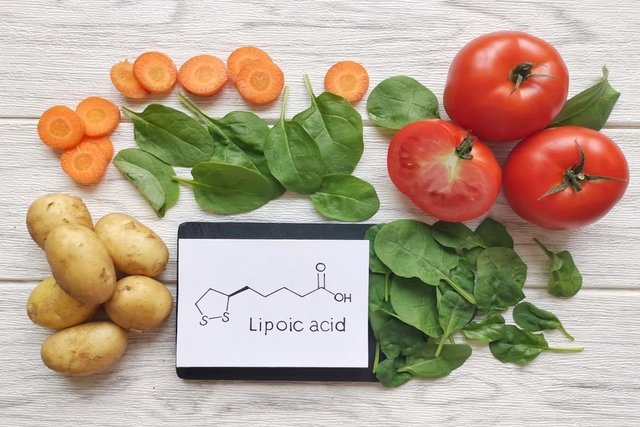Alpha-lipoic acid (ALA) is an antioxidant produced by the body and found in all cells, helping to transform glucose into energy. Furthermore, this acid can regulate blood sugar, promote weight loss and take care of heart health.
Antioxidants prevent damage caused by free radicals to healthy cells, so alpha-lipoic acid helps reduce oxidative stress. As we age, the production of this acid in the body decreases. Understand better what antioxidants are for.
Alpha-lipoic acid can be found in some foods, such as meats and vegetables, and, in general, maintaining a healthy diet helps maintain adequate levels of this antioxidant. However, alpha-lipoic acid supplementation may be indicated in cases of low consumption or to help treat neuropathies, for example.

What is it for
Alpha-lipoic acid serves to:
1. Reduces oxidative stress
When food is ingested and metabolized by the body, a series of oxidation reactions occur, where small amounts of free radicals are produced. Excess free roots have been associated with tissue deterioration and the development of chronic and degenerative diseases.
Alpha-lipoic acid has antioxidant properties that help the body defend itself against free radicals. Furthermore, it can also help regenerate other antioxidants and make them active again, reducing oxidative stress.
2. Regulates blood glucose
Alpha-lipoic acid can help regulate blood glucose levels, especially in people suffering from type 2 diabetes and pre-diabetes, as this disease causes inflammation in the body, increasing the amount of free radicals.
Alpha-lipoic acid helps improve the efficiency of the hormone insulin, transporting sugar to cells and absorbing it, preventing insulin resistance. This, in turn, helps reduce blood sugar and control or prevent diabetes.
3. Prevents and improves neuropathies
Alpha-lipoic acid may help prevent or improve symptoms associated with neuropathies such as diabetic neuropathy, alcoholic neuropathy and carpal tunnel syndrome, for example, by protecting nerves from free radical damage and improving the speed of communication between the cells of the nervous system, as well as their sensitivity.
4. May Promote Weight Loss
Alpha-lipoic acid can reduce appetite, promoting weight loss. It is believed that this happens due to the inactivation of a molecule in the brain that is related to calorie consumption, favoring the reduction of calorie consumption.
However, studies with humans are still needed to prove the possible benefits of alpha-lipoic acid in weight loss.
5. Take care of heart health
Alpha-lipoic acid can help improve blood flow as it promotes the dilation of blood vessels, facilitating blood circulation and preventing high blood pressure.
Due to its antioxidant power, alpha-lipoic acid can also help reduce total cholesterol and triglycerides in people with metabolic syndrome, preventing their accumulation in plaques in blood vessels and preventing heart diseases such as atherosclerosis, heart attack or stroke. .
6. Improves tinnitus
Alpha-lipoic acid may help reduce the perceived intensity of tinnitus and psychological distress in people suffering from cochlear dysfunction associated with metabolic syndrome.
Tinnitus is the perception of a buzzing, roaring or ringing in the ears, which causes immense discomfort. Find out more about tinnitus.
7. Prevents premature aging
Topical use of alpha-lipoic acid can help prevent premature aging because it improves skin dryness, increases collagen production, and prevents damage caused by free radicals produced by exposure to sunlight.
These properties of alpha-lipoic acid can prevent and delay the formation of wrinkles and expression lines associated with photoaging, in addition to taking care of skin health in general.
8. May prevent some types of cancer
Due to its antioxidant power, alpha-lipoic acid can inhibit the multiplication and growth of some types of cancer cells, in addition to promoting cell death.
Some studies have indicated that this has been observed in breast, thyroid, lung, and colon cancer cells, as well as Kelly’s neuroblastoma. However, more research is needed to prove the possible benefits of alpha-lipoic acid in preventing and treating cancer.
9. Maintains brain health
Alpha-lipoic acid can help prevent dementia and Alzheimer’s, it is believed that this is due, in addition to its antioxidant and anti-inflammatory properties, to the fact that it increases the production of acetylcholine, a neurotransmitter that promotes brain functions, such as memory. , attention and learning.
How to consume
Alpha-lipoic acid can be consumed through the intake of some foods or in the form of supplements and topical creams.
1. Foods rich in alpha lipoic acid
Foods rich in alpha-lipoic acid are red meat, potatoes, broccoli, Brussels sprouts, carrots, spinach, peas, brewer’s yeast and beets.
2. Supplements
Supplements may be recommended by your doctor in cases of low consumption of alpha-lipoic acid foods or to help treat neuropathies.
The generally recommended daily dose is between 300 and 600 mg, preferably together with other antioxidants such as glutathione, vitamin C, vitamin E, selenium or coenzyme Q10, for example.
Furthermore, alpha-lipoic acid should always be taken between meals, at least 2 hours after the meal, as ingestion with food impairs its absorption.
3. Alpha-lipoic acid cream
Alpha-lipoic acid can also be added to some creams, along with other ingredients, and is recommended for topical use in concentrations between 1 and 5%. In these cases, it is important to follow the dermatologist’s instructions before using it.
Possible side effects
Possible side effects of taking too much alpha-lipoic acid are stomach pain, diarrhea, headache, migraine, rashes, or skin irritation.
Additionally, when alpha-lipoic acid is used along with diabetes control medications, it can also cause hypoglycemia, including symptoms such as dizziness, nausea, cold sweats, tremors, and weakness. See how to identify the symptoms of hypoglycemia.
Who shouldn’t use
The alpha-lipoic acid supplement should only be taken under the guidance of a doctor by children, pregnant or breastfeeding women, as there are still no scientific studies that prove its safety in these situations.
People undergoing chemotherapy or taking oral hypoglycemic agents, levothyroxine or vitamin B1, should always consult their doctor before taking an alpha-lipoic acid supplement. This is because this supplement can interact with medications, altering their effect on the body.

Sign up for our newsletter and stay up to date with exclusive news
that can transform your routine!
Warning: Undefined array key "title" in /home/storelat/public_html/wp-content/plugins/link-whisper-premium/templates/frontend/related-posts.php on line 12
Warning: Undefined array key "title_tag" in /home/storelat/public_html/wp-content/plugins/link-whisper-premium/templates/frontend/related-posts.php on line 13



